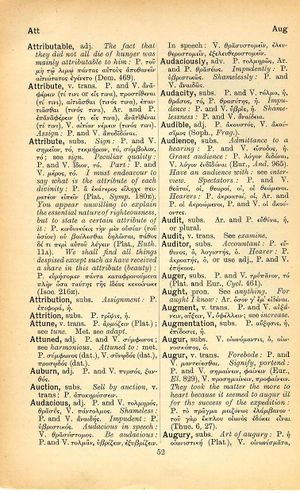augur: Difference between revisions
From LSJ
(Woodhouse 2) |
(CSV3) |
||
| Line 1: | Line 1: | ||
{{ | {{Woodhouse1 | ||
| | |Text=[[File:woodhouse_52.jpg|thumb|link={{filepath:woodhouse_52.jpg}}]]'''subs.''' | ||
V. [[οἰωνόμαντις]], ὁ, οἰωνοσκόπος, ὁ. | |||
'''v. trans.''' | |||
<b class="b2">Forebode</b>: P. and V. μαντεύεσθαι. | |||
<b class="b2">Signify, portend</b>: P. and V. σημαίνειν, φαίνειν (Eur., ''El.'' 829), V. προσημαίνειν, προφαίνειν. | |||
<b class="b2">They took the matter the more to heart because it seemed to augur ill for the success of the expedition</b>: P. τὸ [[πρᾶγμα]] [[μειζόνως]] ἐλάμβανον . τοῦ γὰρ ἔκπλου οἰωνὸς ἐδόκει εἶναι (Thuc. 6, 27). | |||
}} | }} | ||
Revision as of 09:21, 21 July 2017
English > Greek (Woodhouse)
subs.
V. οἰωνόμαντις, ὁ, οἰωνοσκόπος, ὁ.
v. trans.
Forebode: P. and V. μαντεύεσθαι.
Signify, portend: P. and V. σημαίνειν, φαίνειν (Eur., El. 829), V. προσημαίνειν, προφαίνειν.
They took the matter the more to heart because it seemed to augur ill for the success of the expedition: P. τὸ πρᾶγμα μειζόνως ἐλάμβανον . τοῦ γὰρ ἔκπλου οἰωνὸς ἐδόκει εἶναι (Thuc. 6, 27).

